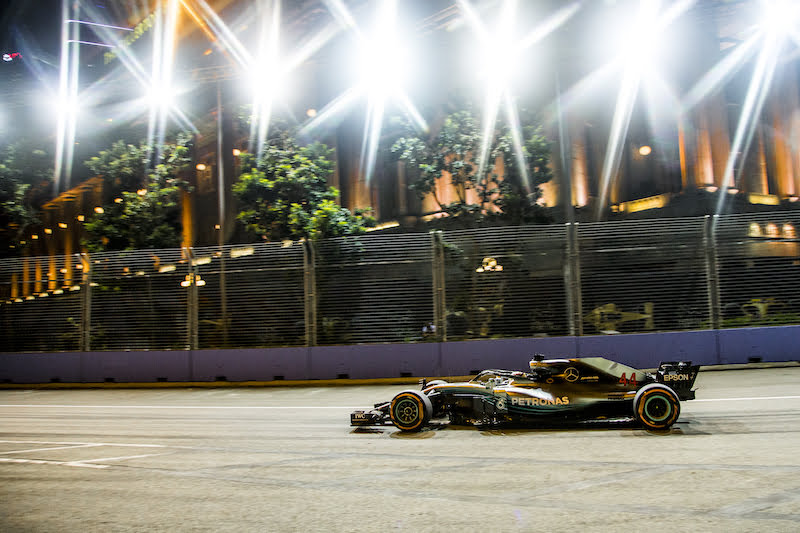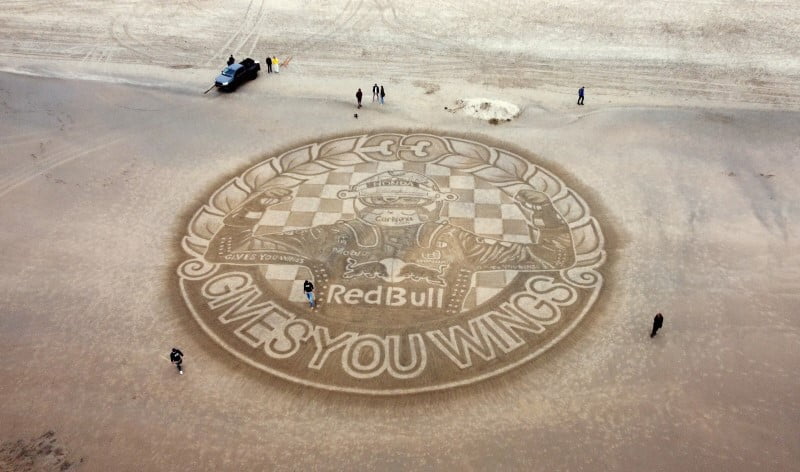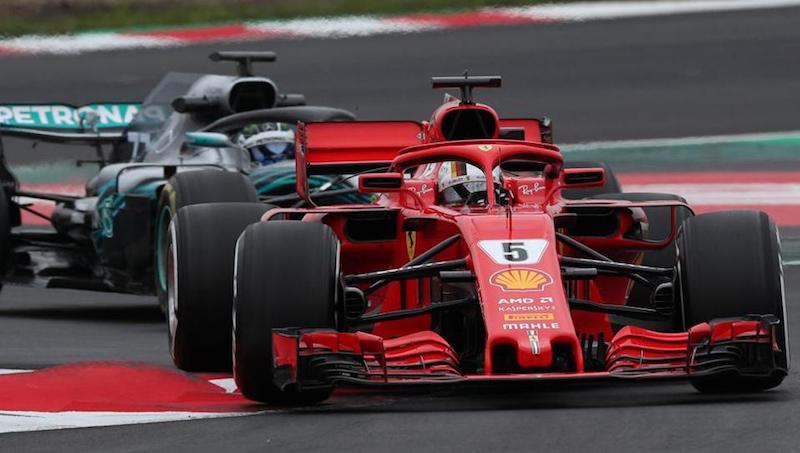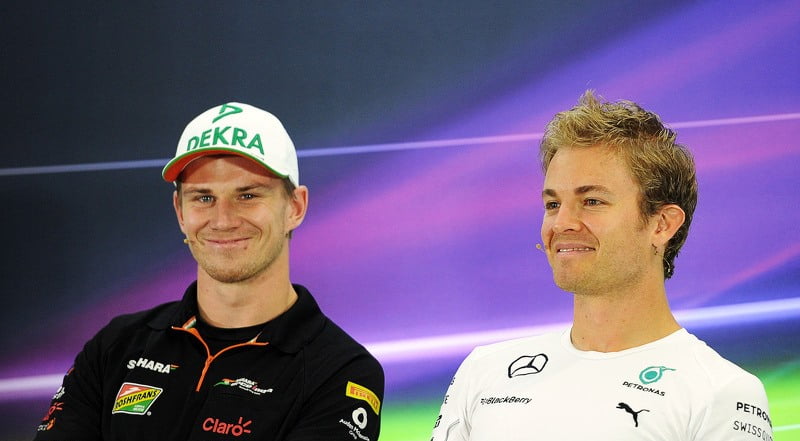Lewis Hamilton is the perfect embodiment of Liberty Media’s vision for Formula 1 – embracing the show without compromising on speed!
Lewis Hamilton is the champion that the world of Formula 1 desperately needs. From his humble beginnings — he was born in Stevenage on the “wrong side of the tracks” — to meeting Ron Dennis at an awards function at the age of 10, to being crowned Formula 1’s ‘youngest world champion’ in 2008 and to now becoming a five-time world champion, Hamilton’s journey is the stuff real-life legends are made of.
His glorious set of records speak for themselves — five Formula 1 World Championships, 71 Grand Prix victories, 81 pole positions. A victory in each of the 12 seasons he has raced in and several other records — the list goes on. In fact, Hamilton’s fifth world title win has catapulted him into a highly coveted league of Formula 1 greats — with other members being the late great Juan Manuel Fangio and Michael Schumacher. The fifth title also allows Hamilton to eclipse rival and quadruple world champion Sebastian Vettel and establish himself as the most successful of this racing era.
While naysayers have pointed out the lack of competitive cars for Hamilton to beat this season, let’s also remember that many of his predecessor champions had even fewer competitive cars to beat!
The Schumacher comparison
Just as no Indian cricketer in this generation can escape comparisons with Sachin Tendulkar (here’s looking at you, Virat) comparisons between Hamilton and Schumacher are inevitable. Predictable, even.
In fact, most publications have run their own calculations to prove how Hamilton could not only eclipse Schumacher’s record of 91 Grand Prix victories but also match his championship tally over the next two years. Clearly, there is no possible conclusion with regards to whether Hamilton is (or will be) Formula 1’s ‘Greatest of All Time’. Let’s remember that comparisons across eras are based on statistics, which only tell parts of the story.
Interestingly and expectedly, moments after sealing his fifth title, Hamilton was asked if Schumacher’s all-time record of seven Formula 1 World Championships was in his sight. Donning the role of the perfect diplomat (in contrast to his otherwise outspoken self) Hamilton waved off the question, saying, “Let me just try and realise that I’ve won this one!” In a sport marked with volatility and vacillation, Hamilton’s response was all about soaking in the overwhelming present.
As much as this piece is a celebration of Hamilton, the harsh truth about Formula 1 is that your destiny is defined by the car you drive. In fact from 2000 to 2018, we have seen three teams dominate the sport like no other — Ferrari (2000-2004), followed by Red Bull Racing (2010-2013) and Mercedes (2014 onwards). In this context, it is to Hamilton’s credit that when he won his maiden Drivers’ Championship in 2008; it was one of those rare seasons where the Constructors’ Champion was a different team (Ferrari, in this case). The only other drivers to have achieved this feat in the 90s were Michael Schumacher (1994) and Mika Hakkinen (1999).
While Hamilton’s critics are quick to point out that his three titles at Mercedes are a function of him having the best car on the grid, let’s remember that it was Hamilton’s talent and spunk that brought the best car to him. When Hamilton moved from the legendary team McLaren to Mercedes in 2013, the team was still in its infancy — and had never won a world title. Most in the paddock were convinced that Hamilton had committed career suicide — but in retrospect, it was this very leap of faith that catapulted him into greatness, enabled him to chase, equal and break countless records.
An interesting adage in Formula 1 is that you can tell a lot about the calibre of a driver from the people he has beaten on the track. Hamilton’s conquests are biggest and the best of our times — Fernando Alonso, Sebastian Vettel, Kimi Raikkonen, Nico Rosberg and Jenson Button.
The 2018 season triumph
Gradually, the tide seemed to shift. Ferrari, who put on a dominant show at the 2018 Belgian Grand Prix (only six races ago!), simply fizzled away from contention. Clearly, Hamilton-Mercedes’ ability to race cleanly, clinch pole positions and win races that he otherwise shouldn’t have put pressure on Ferrari. This saw them crack for the second season in succession.
What happened at the 2018 German Grand Prix is particularly telling in context of the season. There, Hamilton claimed an unexpected victory despite starting in a lowly 14th place (after a mechanical issue in qualifying) even as title nemesis Vettel crashed out while in the race lead. Likewise at Monza, Hamilton’s ability to keep himself in the fight on the first lap and Ferrari’s non-use of team orders saw the Briton claim victory on Ferrari’s home soil. At Russia, Mercedes were wise enough to employ team orders (however unpopular they may be) to help Hamilton consolidate his lead over Vettel in the Drivers’ Championship. In this regard, to classify 2018 as a championship that Ferrari-Vettel “threw away” due to mistakes is an unworthy way of celebrating Hamilton’s remarkable performances — especially since it was the driver who made the difference over the season and not just his car.
Formula 1’s best ambassador
It is difficult to put a finger on what makes Hamilton so special for Formula 1. Surely it is not just about his talent or speed. In a grid filled with racers, Hamilton is a rockstar. His larger-than-life personality, individuality and unconventional ways make him stand out, results notwithstanding. In an era when drivers are little more than politically correct PR machines, Hamilton says it as it is. He effortlessly connects with fans who see him as raw, authentic, human (and hence flawed) — someone who has come up the hard way.
And just when you think you know him, you are proven wrong — his personality is a heady mix of every paradox imaginable. Sometimes he’s a Hollywood diva, other times he’s the people’s champion picking up rubbish from the beaches of Mykonos — aspiration meets accessibility in a perfect, high-octane cocktail.
Even better, Hamilton perfectly embodies the crossroads that Formula 1 as a sport is at — trying to embrace the show, without compromising on the speed. His flamboyance is a doff of the helmet to the champions of the yesteryears, even as his millennial Snapchat-friendly ways endear him to younger audiences (who are Formula 1’s future). Of course, Hamilton’s controversial ways have earned him the dubious honour of being the grid’s most polarising driver — loved, hated but never ignored — just the way Schumacher was back in his time. A sport like Formula 1 needs heroes — but it also needs villains. If the popular phrase ‘nice guys finish last’ is true, a champion like Hamilton packs in the best — and worst — of what makes a truly great Formula 1 champion.
Where Hamilton’s story will go from here remains to be seen. Along with Mercedes’ form, Hamilton’s future also depends on his own motivation levels — two key factors we cannot take for granted. This makes it even more imperative to celebrate the present while keeping absolute hope for the future. Given Hamilton’s extra-curricular interests and investments (in music and fashion), maybe Formula 1 needs Hamilton more than Hamilton needs Formula 1. If nothing else, this prompts us to enjoy the Lewis Hamilton show in Formula 1 for as long as it lasts — given everything that seems wrong with the current formula of Formula 1, Hamilton is definitely not one of them.
This post was first published on Firstpost.














